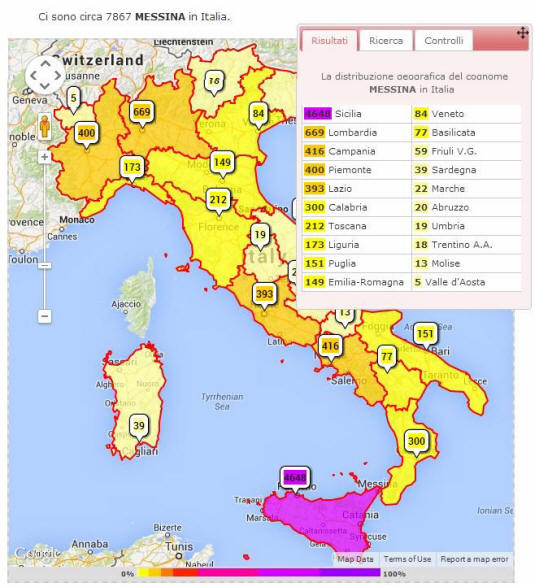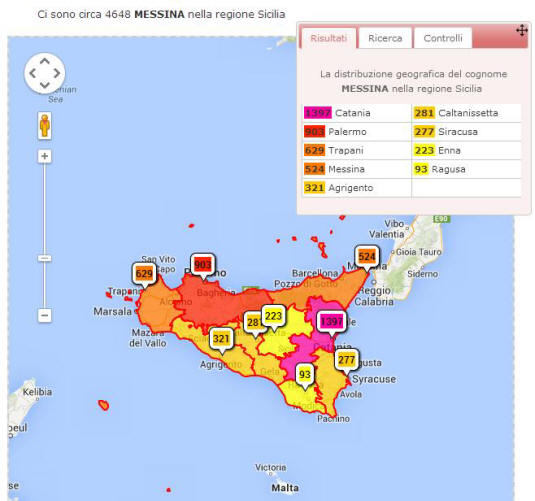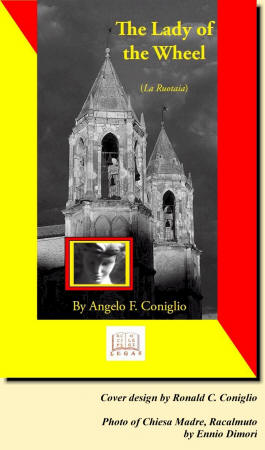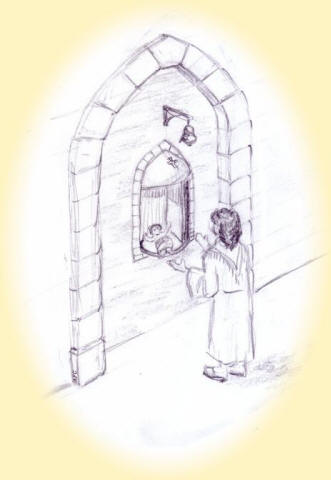|
If you’re
named after a Sicilian City
The present-day
island of Sicily has nine
provinces. Each province has a city, a ‘provincial seat’
that has the same name as the province. These cities
are: Palermo, Trapani, Agrigento (formerly Girgenti), Caltanissetta, Enna
(formerly Castrogiovanni),
Messina, Catania, Siracusa, and Ragusa. My sense of the
matter is that first the cities were named, and then the
regions under their influence acquired the names of their
major city. This often leads to confusion for genealogic
researchers. An immigrant, when asked where he was born, may
have responded, for example “Caltanissetta”, leaving the
researcher to figure out whether he meant one of the many
towns, variously named, in the Province of Caltanissetta, or
whether he actually was born in the city named
Caltanissetta. This puzzle is further complicated if the
immigrant, responding to “Where did you come from?” answered
“Palermo”, which is a seaport. Did he mean he was born in
the city of Palermo, or some other town in the
Province of Palermo, or did he simply mean he
'came from' the
port of Palermo, where he boarded the ship that took him to
America?
An interesting
aspect of these city and provincial names is this: many
Sicilians (as well as Italian mainlanders) have surnames
that are the same as those of these towns and provinces, or
derivations of them (Siragusa for Siracusa; Rausa
for Ragusa; Girgenti for Agrigento). What does this
mean?
Most folks
simply accept their surnames without questioning their
origins. Some, with surnames like Palermo, Messina,
etc., assume that their distant ancestors came from the town
or province bearing that name. In my research experience,
that has not always been the case.
To shed some
light on this naming procedure, I used the Italian website
http://www.cognomix.it/mappe-dei-cognomi-italiani/.
That site allows a search using any surname, and returns
various “hits” including maps of Italy and Sicily like the
ones below for the surname Messina, showing
the modern-day distribution of surnames. |
|
|
| I make no claims about the
accuracy of the maps: the information is probably from
phone, mail, or e-mail databases, and most likely does not
include all persons with a particular surname. But I think
the results can be reasonably compared. The tabulations are
shown here, beginning with the least-common surname. The
number in parentheses after the place-name heading indicates
the number of occurrences of the surname in Sicily. |
|
|
CALTANISSETTA (10):
Caltanissetta appears as a surname only eighteen
times in the site cognomix.it for
all of Italy, including only ten in Sicily.
There, nine are in Palermo province and one is
in Catania province, with none in Caltanissetta,
nor any of the other provinces.
Caltanissetta is a modification of the
Arabic name Qalat al Nisaà or “Fort of
Women”. |
|
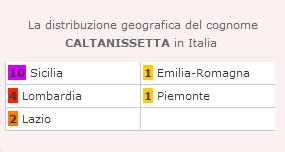 |
|
 |
|
|
|
ENNA (13 + 246): Enna, the city, is
the oldest surviving city in Sicily, having been
founded before 1100 BC by the indigenous
Sicani. The ancient name was Henna, but the
town was known as Castrogiovanni from the
Middle Ages until 1926, when it was changed to
Enna, which is also the name of its
province. The site cognomix.it
shows 164 instances of the surname Enna
in all of Italy, surprisingly with 120 in
Sardinia and only 13 in Sicily. The
distribution in Sicily is 11 in Palermo
province, with one in Trapani province and only
one in Enna province, none in the other
provinces. The surname Enna is the
modern pronunciation of the ancient name
Henna.
The
surname Castrogiovanni occurs 471 times
in all of Italy, with the preponderance (246) in
Sicily, where most (94) occur in Enna province.
This seems reasonable, as the greatest
occurrence is in the province in which the town
is located. However, as we shall see, this is
the exception rather than the rule. The meaning
of Castrogiovanni is “Fortification of
Giovanni”. |
|
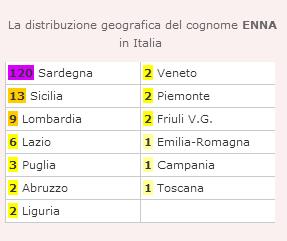 |
|
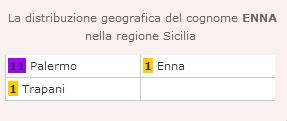 |
| |
|
|
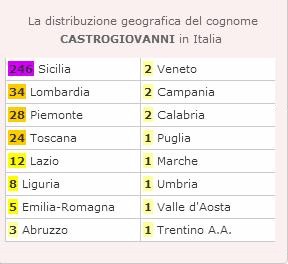 |
|
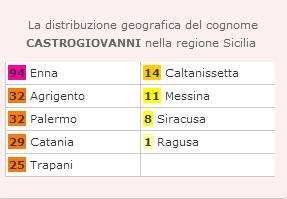 |
|
|
|
AGRIGENTO (241):
There were no individuals found with this
surname, however the ancient name of the town
was Girgenti, and that surname appears
601 times for all of Italy, including 241 in
Sicily. In Sicily, the greatest number, 119,
occurs in Palermo province, with only 27 in
Agrigento province. Agrigento and the
ancient version Girgenti are derived from
the name of the Greek settlement there, called
Akragas. |
|
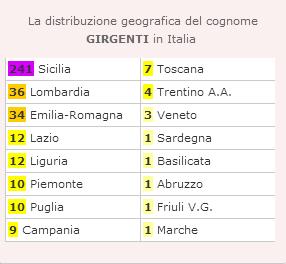 |
|
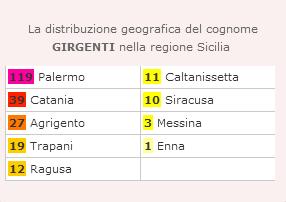 |
|
|
|
TRAPANI (826): The
surname Trapani appears 1,792 times in
Italy, including 826 in Sicily. The greatest
number in Sicily, 318, occurs in Palermo
province, with Trapani province coming in second
with 149. The surname Trapani is
derived from the Greek
Drépanon,
which means “sickle”, from the shape of the
harbor of the town of Trapani.
|
|
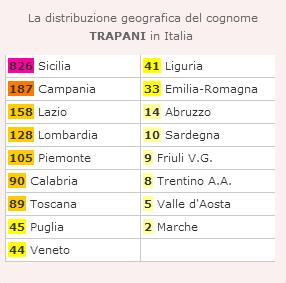 |
|
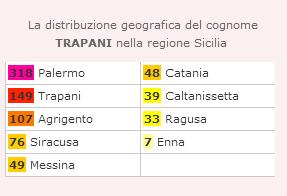 |
|
|
|
SIRACUSA (1,059):
The surname derived from this place is spelled
as either Siracusa or Siragusa.
They occur 1,699 times in Italy, including 1,059
in Sicily. Siracusa occurs 143 times in
Messina province, and only 29 in Siracusa
province; while the form Siragusa has 392
occurrences in Palermo province, with only 4 in
Siracusa province. Siracusa/Siragusa is
derived from the Greek
syrako,
meaning swamp or marsh, describing the town’s
environs. |
|
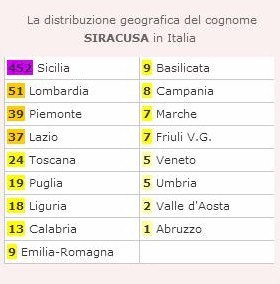 |
|
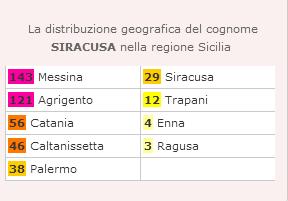 |
| |
|
|
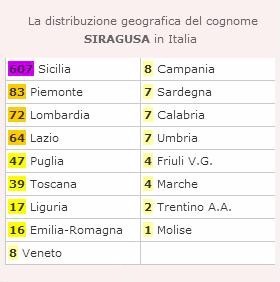 |
|
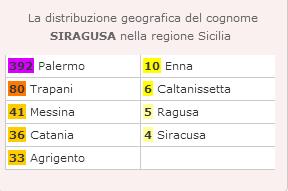 |
|
|
|
PALERMO (1,147):
Palermo is a very common place-name-derived
surname, with 3,499 in all of Italy, with the
largest representation being in Sicily with
1,147. But the greatest occurrence is not
in Palermo province, but in Trapani province
with 238. The provinces of Catania (219),
Agrigento (174) and Caltanissetta (156) all have
more than Palermo province, which has 141.
Palermo is the result of successive changes
in the name of the city from the Greek
Panormus, meaning “complete port”, to the
Arabic Bal’harm, to the present
Palermo. |
|
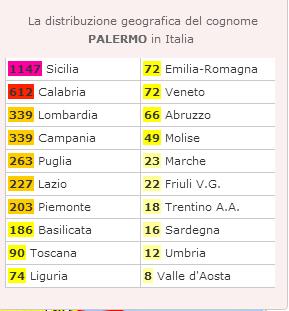 |
|
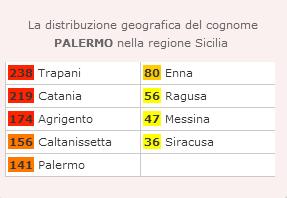 |
|
|
|
RAGUSA (1,509): The surname derived from
this place name takes two forms, Ragusa
and the far less common Rausa. Combined,
it occurs 2,376 times in Italy overall, and
1,509 in Sicily. Its greatest occurrence is in
Catania province, with 501, while Ragusa
province is second with 290. The name Ragusa
is thought to derive from the Byzantine Greek
word rogos, meaning ‘granary’, because of
the richness of the agricultural region.
|
|
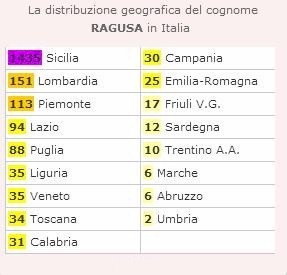 |
|
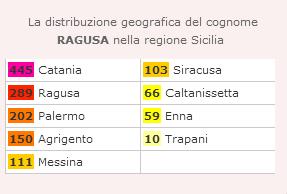 |
| |
|
|
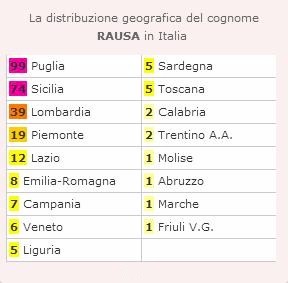 |
|
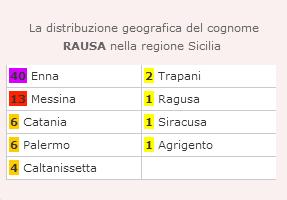 |
|
|
|
CATANIA (1,663):
Catania occurs as a surname 2,675 times in
Italy, with 1,663 occurrences in Sicily. Catania
province itself has the most Catania
surnames in Sicily, 632, followed by the
provinces of Messina (205) and Palermo (168).
The surname Catania comes from the name
of the ancient Greek settlement
Katáne. |
|
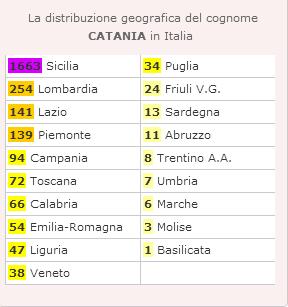 |
|
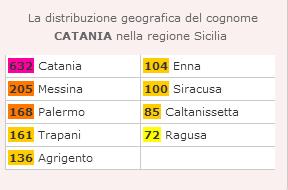 |
|
|
|
MESSINA (4,648):
Messina is by far the most common
place-name-derived surname, with 7,867 in all of
Italy, the majority of them (4,648) in Sicily.
But the greatest occurrence of the surname
Messina is not in Messina province,
which has only 524, but in Catania province with
1,397. Two other provinces have more Messina
surnames than does Messina province: Palermo
province with 903, and Trapani province with
629. The original Greek settlement in the area
was called Zancle by them, but was
changed in 500 BC to Messene to honor the
city in Greece by the same name. The modern
name of the city, its province, and the surname,
is Messina. |
|
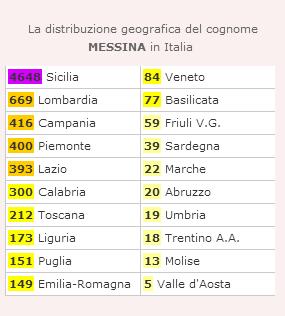 |
|
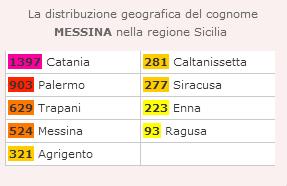 |
|
| |
|
So what does
this all signify? Some conclusions may be drawn. As
might be expected, the three most widely seen and numerous
of these nine Sicilian place-surnames; Palermo,
Catania and Messina, reflect the three Sicilian
provinces with the largest populations. In only one
province, Catania, does the surname derived from that
province occur more than it does in the other provinces.
The surname Castrogiovanni does occur more in Enna
province than in any other. But of the other seven surnames
considered, each occurs most in a Sicilian province other
than the one that bears the name:
The surname
Caltanissetta occurs most in Palermo province, as
do the surnames Girgenti, Trapani and
Siragusa.
But the surname
Palermo occurs most not in that province,
but in Trapani province.
The surname
Siracusa occurs most in Messina province, while the
surname Messina occurs most in Catania province, as
does the surname Ragusa.
Of course,
these are modern numbers; the distributions would have
been different centuries ago, when surnames first began to
be used. And today, certainly, most of these surnames may
be found not only in Italy and Sicily, but in America and
all over the world.
One explanation
of the anomalies presented above, I believe, is that in
certain cases the surnames were given to
foundlings, whose
ancestral names were not known. For centuries, in Sicily,
foundlings were given stigmatic surnames by their
discoverers: Proietto (castoff), Esposto
(exposed), Trovato (found), and so on. Even crueler
names like Milingiana (eggplant) and Giumento
(mare) were used, and townspeople knew immediately that
children were
born out of wedlock. Of course, when boys with these
surnames matured and married, their children took the
made-up surnames as valid, legitimate names, and their sons
passed them on to their descendants, most of whom
have no knowledge that somewhere in their distant ancestry
was an abandoned child.
Eventually,
laws were passed proscribing these unkind surnames, but
milder ones could be just as damning: surnames like di
Dio (of God), di Giugno (born in June), del
Popolo (of the people), etc. In some cases, such
children were given the name of the town or province they
were born in, a kind of generic surname. However, more
often, foundlings were given surnames derived from other,
more distant towns or provinces. Hence, a foundling in
Palermo might be named Messina, while one in Messina
might be named Siracusa. While these names may today
seem innocuous, in effect, they were as stigmatic as some of
the more brusque names of previous times. The reason?
Giving a child born in Palermo the surname Messina
effectively labeled him or her as ‘from elsewhere’, that is,
‘a stranger’; that is, ‘a foundling’.
There is some evidence for
another reason for 'place names as surnames':
During the Spanish Inquisition (during which Sicily was
ruled by Spain), Jews were expelled from Sicily, or killed,
or forced to (apparently) renounce their religion and accept
Christianity. Many changed their surnames in
attempts to obscure their heritage, and took names
reflecting their residency: Trapani or di Trapani, Palermo,
Messina, etc. Just as all 'Trapanis' are not descended
from foundlings, neither are they necessarily originally of
Jewish descent. It is, however, a possibility.
Another possibility: The 'place name as surname'
may have originally been given to an individual as an
ngiuria
or nickname to indicate a similarity of
mannerisms, appearance, or speech to a person from
that place, e. g. 'Barese' (like someone from Bari), 'Palermitano'
(like someone from Palermo), and so on.
Whether my
theories are correct or not, whatever the origins of
these ubiquitous surnames, today they’re recognized as marks
of true sicilianità (Sicilian-ness); names to
be proud of, echoing with memories of the homeland that sent
forth daring pioneers to find a better life for their
families in America.
Of course, there are many other place-name derived
surnames, with the names of towns other than those of
provincial capitals. My experience has been that these
surnames as well, generally occur outside of the province in
which the town with the eponymous name lies. The
surname Vallelunga, for example, occurs most
often in Palermo province, not in Caltanissetta, the
province of the town of Vallelunga; the town of Butera
is also in Caltanissetta province, but the preponderance of
Butera surnames is in Palermo and Agrigento
provinces. Mistretta is a town in Messina Province,
yet the surname Mistretta occurs most often in
Trapani Province, and the surname Gangi occurs
most in Catania Province, not in Palermo Province, which has
a town named Gangi; etc., etc. Interestingly, some place-name
derived surnames on the Appenine peninsula, outside of
Sicily, exhibit the same anomaly. The surname
Calabrese is most common in Puglia, not Calabria
province, and Pugliese is more common in
Calabria than in Puglia! And there are more
folks named Napoli in Sicily than there are in
the province of Napoli. See the table below for
information on a number of Sicilian place-named surnames.
Viva
Caltanissetta, Enna,
Castrogiovanni, Girgenti,
Trapani, Siracusa, Siragusa,
Palermo,
Ragusa, Catania,
and Messina!!! |
|
|
|
